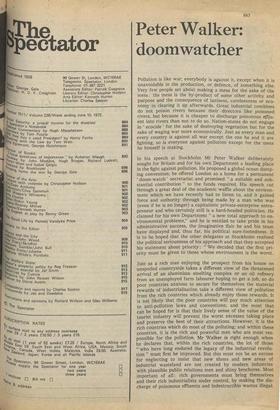Peter Walker: doomwatcher
Pollution is like war; everybody is against it, except' when it is unavoidable in the production, or defence, of something else. Very few people set about making a mess for the sake of the mess : the mess is the by-product of some other activity and purpose and the consequence of laziness, carelessness or economy in clearing it up afterwards. Great industrial combines do not poison rivers because their directors like poisoned rivers, but because it is cheaper to discharge poisonous effluent into rivers than not to do so. Nation-states do not engage in ecocide ' for the sake of destroying vegetation but for the sake of waging war more economically. Just as every man and every country is against all war except the one he and it are fighting, so is everyone against pollution except for the mess he himself is making.
In his speech at Stockholm Mr Peter Walker deliberately sought for Britain and for his own Department a leading place 898 in the fight against pollution. He proposed a global ocean dumping convention; he offered London as a home for a permanent ' doom-watch ' secretariat and promised "a suitable and substantial contribution " to the funds required. His speech cut through a great deal of the academic waffle about the environment which we have recently had to listen to, and it gained force and authority through being made by a man who was (even if he is no longer) a capitalistic private-enterprise entrepreneur and who certainly still is a hard-headed politician. He claimed for his own Department " a new total approach to en 904 vironmental problems," and he is entitled to take pride in his 905 administrative success, the imaginative flair he and his team
900 901 901 902 902 902 902 903 903
have displayed and, thus far, his political sure-footedness. It is to be hoped that the other delegates at Stockholm realised the political seriousness of his approach and that they accepted his statement about priority : "We decided that the first priority must be given to those whose environment is the worst.
Just as a rich man enjoying the prospect from his house on unspoiled countryside takes a different view of the threatened arrival of an aluminium smelting complex or an oil refinery from an unemployed farm labourer hoping to get a job, so do poor countries anxious to secure for themselves the material rewards of industrialisation take a different view of pollution from the rich countries which already enjoy those rewards. It is not likely that the poor countries will pay much attention to anti-pollution laws and conventions; and the most that can be hoped for is that their lively sense of the value of the tourist industry will prevent the worst excesses taking place and preserve the best of their attractions. However, it is the rich countries which do most of the polluting; and within these countries, it is the rich and powerful men who are most responsible for the pollution. Mr Walker is right enough when he declares that, within the rich countries, the lot of those "who have long endured the legacy of the industrial revolution" must first be improved. But this must not be an excuse for neglecting to insist that new slums and new areas of industrial wasteland are not created by modern industries with plausible public relations men and shiny brochures. Most important of all : rich governments must bring themselves and their rich industrialists under control, by making the discharge of poisonous effluents and indestructible wastes illegal.








































 Previous page
Previous page